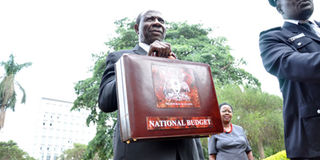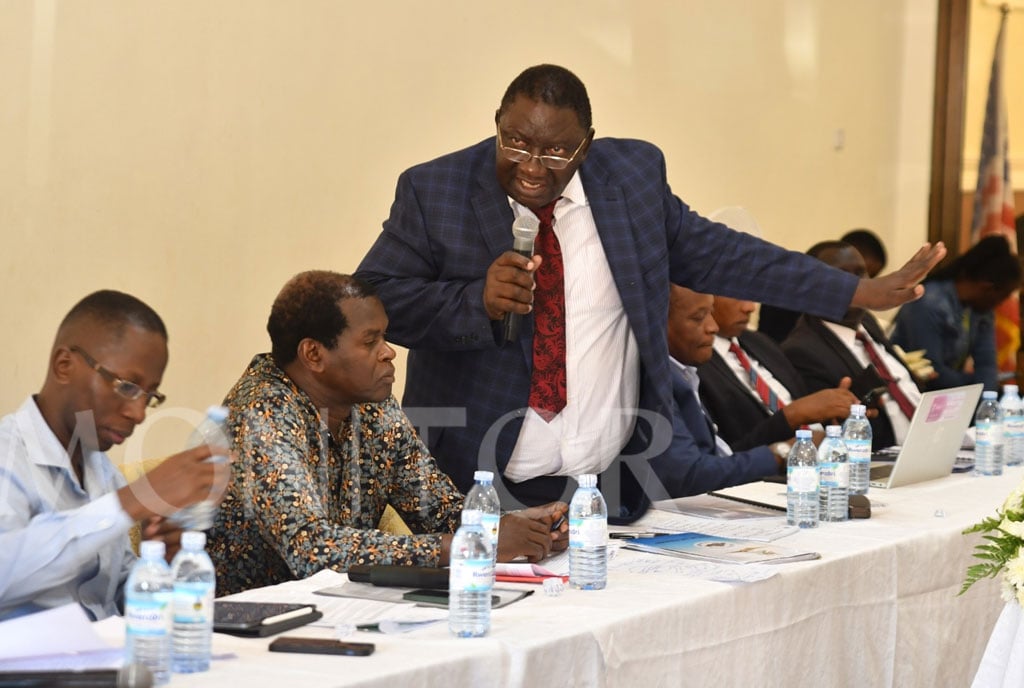Govt plans new, higher taxes

Finance minister Matia Kasaija has proposed a cocktail of taxes in the post-election budget. File Photo
What you need to know:
The hikes. Taxes to be increased include those on cement, sugar, fuel, used clothes, used shoes, alcohol and cigarettes, television sets and diapers, among others
Parliament.
Finance minister Matia Kasaija has proposed a cocktail of taxes in the post-election budget.
The minister wants to amend the Excise Duty Act 2014 to increase taxes on all types of cigarettes, ready-to-drink spirits, cement, motor spirit (gasoline), gas oil (automotive, light, amber for high speed engine), cane or beet sugar and chemically pure sucrose in solid form, motor vehicle lubricants, confectioneries (chewing gum, sweets and chocolates).
Explaining what is called “minimal tax increases” the ministry spokesperson, Mr Jim Mugunga, said: “this is not about political honeymoon ending, it’s about Uganda working on its tax collection efficiencies so that we all pay a fair share of our obligation to national revenue.”
In the Finance (Amendments) Bill, 2016, Mr Kasaija also proposes to increase the rate of the environmental levy imposed on used clothing, used shoes and other used articles from 15 per cent to 20 per cent of the Cost, Insurance Freight (CFI) value. However, Mr Julius Kapwepwe Mishambi, a director at Uganda Debt Network (UDN) and other analysts, have asked government to boost the citizens household incomes to enable them purchase brand new cotton products.
“Starting the journey out of mivumba (second-hand outfits), is a welcome move but should be phased over seven years and demonstrated through investment in value chain of the cotton and animal husbandry sub-sectors,” Mr Kapwepwe said.
Taxes will be charged on the importation of un-denatured alcohol, lubricants, steel and steel products, electronics, including fridges, washing machines, radios, DVD Players and television sets, paper and paper products and diapers. The minister has proposed that these items be removed from the COMESA waiver.
The minister, however, wants to remove excise duty on specialised hospital furniture and international incoming calls and waived Value Added Tax (VAT) on agricultural processing machinery. There is also a plan under the Finance Amendments Bill, to waive arrears of tax accruing from SACCOs and also exempt clinics from income tax but not drug shops.
Defending the proposed tax increases, Mr Mugunga said: “Rwanda, for example, collects about 16 per cent of GDP while Kenya is at 20 per cent. Uganda on the other hand collects 13 per cent, far lower than most sub-Saharan Africa given its average.” According to analysts and MPs who talked to Daily Monitor, the post-election tax measures in Mr Kasaija’s second budget seek to close the revenue gaps created by election spending and the projected decline in donor aid on account of a disputed presidential poll. “The new taxes are a result of the expected budget deficit,” said Prof Venansius Baryamureeba, a former presidential aspirant. “President Museveni expects donor funding for budgetary support to go down as a result of the concerns on the recently held presidential elections and what has transpired thereafter in regard to Dr Besigye and the petition before the Supreme Court,” he added.
Unveiling the 2016/17 Budget in Parliament last week, state minister for Planning David Bahati put the total government expenditure at Shs21.2 trillion with Shs14.4 trillion marked as domestic revenue, [representing 68 per cent, down from 76.4 per cent in the current financial year] and Shs6.7 trillion as external funding through grants and loans.
The government spending in the post-election year is, however, expected to reduce by about Shs3.9 trillion. In the current financial year (2015/16), the total approved budget is Shs23.972 trillion accounting for Shs11trillion in domestic revenues.
In the 2016/17 Budget, Mr Kasaija fleshes out drastic revenue measures to prevent big companies, prosperous none-residents and people employed by diplomatic institutions dodging the taxman. At the same time, the minister raids the poor by increasing taxes on secondhand clothes, used shoes and other related items.
For instance, under the proposed amendments to income tax, the government wants to amend the definition of petroleum taxation; to impose an obligation on persons employed by diplomatic institutions and institutions with diplomatic privileges to file returns of income with URA and imposed VAT on suppliers to contractors executing Aid funded projects.
The minister wants to revise the non-tax revenue relating to services and documents under the Traffic and Road Safety Act, 1998. For instance, Clause 4, seeks to amend Section 31 of Cap. 361 to change the period for notifying a licensing officer about a change in the ownership of a motor vehicle from fourteen days to three months and to make it an offense to fail to notify a licensing officer within that period.
All tax arrears owed by a SACCO as at December 31, 2015 have been waived and all fees in respect of the Mining Act, 2003, prescribed in Schedule 1 of the Finance Act, 2013, cancelled.
The minister further proposes to exempt the supply of any goods and services to the contractors and sub-contractors of hydroelectric power, solar power, geothermal power projects and to provide for related matters. The new tax measures are subject to parliamentary approval before they come into force on July 1 when the 2016/17 financial year begins. The tax Bills have been sent to House Finance Committee for scrutiny.
Proposed new taxes
• Soft cap Shs50,000 per 1,000 sticks (cigarettes)
• Hinge lid Shs80, 000 per 1,000 sticks (cigarettes)
• Cigars, cheroots and cigarillos containing tobacco 200 per cent
• Smoking tobacco 200%
• Homogenised or reconstituted tobacco 200%
• Other 200%
• Ready to drink spirits 80%
• Cement Shs1,000 per 50kgs
• Motor spirit (gasoline) Shs1,100 per litre
• Gas oil (automotive, light, amber for high speed engine) Shs780/- per litre”
• Cane or beet sugar and chemically pure sucrose in solid form Shs100 per kg
• Motor vehicle lubricants 10%
• Confectioneries (chewing gum, sweets and chocolates) 20 per cent
• Increase the rate of the environmental levy charged on used clothing, used shoes and other used articles 15 to 20%




